Dan Arlin is a feeder driver (responsible for transporting packages and freight to and from local delivery hubs and sorting facilities) and Teamster shop steward in Springfield, Massachusetts. He has been a member of Teamsters Local 404 for his 23 years at UPS. In March 2022, he was unjustly fired. After months of trying to clear his name while UPS withheld records, Arlin filed charges against the company with the NLRB. After eleven months, including months of arbitration, Arlin was eventually reinstated to his job with back pay. Arlin is host of The Bi-Weekly Grievance Show.
Luigi Morris: You were wrongly terminated and out of work for eleven months. What happened?
Dan Arlin: It all goes back to March of 2022. I went into work one morning, and they brought me to the office and terminated me for “dishonesty,” for “falsification of records,” and for “not working in the best interest of the company.” When I asked what I did, they wouldn’t actually tell me what it is that I did wrong. Eight days later, we had a local-level hearing. And that’s when they made the accusations.
They accused me of falsifying records at a pickup, but they had their own internal reports which cleared me of any wrongdoing. However, they withheld those reports for over four months. I had to file charges with the NLRB because the company refused to turn them over. Finally, the NLRB ordered them to turn over the records. Even with the proof that I did nothing wrong, they still kept me out of work for a total of eight months. The arbitrator got me back to work and cleared me of any wrongdoing.
Four days later, we had a meeting to discuss my reinstatement. When we walked in, instead of reinstating me, they turned around and re-terminated me for union activity. So I went back to arbitration and won two straight arbitrations. So I was out a total of eleven months before I went back to work. I am still fighting that. The NLRB is going to formally charge the company and it’s most likely going to go to trial, plus I’m in the process of seeking civil suits against the supervisors and the company for what they did to me.
This harassment was one hundred percent because of my union activity. What happened to me is probably not uncommon. Anybody that stands up for their rights, even as simple as filing a grievance, management likes to immediately put discipline on you, and then they’ll say, “Well, if you drop your grievance we’ll drop the discipline.” So it’s their way of getting out from underneath grievances a lot of times. The act of harassment definitely is a common practice at UPS.
My case is probably one of the most egregious stories I’ve heard. At no point did the company ever even present evidence that I did anything wrong, and in fact, withheld evidence that would have cleared my name. That’s pretty bad. I took a financial hit. I almost lost my place, my car, and everything. Everything came together at the right time, and I was able to overcome it, but it got really scary at the end.
What I would say to the younger guys is the best way to stand up for your rights is to do everything correctly at work. Do your job methodically, don’t take shortcuts, just follow the methods. And repeat that every single day. And that way, if you stand up for your rights, they don’t have anything to get you. If you’re the type of driver that is not following the methods or you’re taking shortcuts because you think it’s faster, management is going to use all that stuff against you.
LM: How did you start organizing? What made you get involved with the union?
DA: You know, it started with me just defending my own rights and then grew to helping other members to defend their rights. Over the last three to five years, I’ve actually gotten more progressive and really worked on educating members and helping them out. During my eleven months out of work, rather than sitting home feeling sorry for myself, I used those months to network with Teamsters all over the country. I traveled all over New England and went to strike lines. I made good friends at Local 251 in Rhode Island walking the picket line during their eight-month strike at DHL in Pawtucket, Rhode Island. I walked the picket line eight to ten times. I went to the Massachusetts Museum of Contemporary Art (MASS MoCA) one-day strike up in Pittsfield. I’ve just gone to different picket lines and helped out and networked and got to know people.
Then in October of this last year, I went to Chicago to the TDU conference, and rubbed elbows with some pretty impressive Teamsters and got to know a lot of people, and I had started to do interviews. It wasn’t even necessarily for a podcast, it was just doing interviews to try to share some content on my Facebook page for other members to see, and I developed a passion for it. I realized this is the best way for me to reach out to members and share my knowledge.
My show [The Bi-Weekly Grievance] covers a variety of topics — right now, a lot of it is UPS, but recently I did an interview with Deb Gesualdo who was the president of the Malden Education Association (MEA), and we covered illegal public sector strikes. Because the teachers unions in Malden and Haverhill, Massachusetts both went on strike at the same time. Technically, that’s illegal in our state, but the brave men and women there stood up for their rights and did it anyway, and they were able to get effective contracts out of it.
LM: What are your expectations towards the contract negotiation?
DA: Right now, I truly feel like we’re more solid of a unit as UPS Teamsters than we have been in a very long time. I think, overwhelmingly, the members are tired of the baloney that goes on there, and are all on the same page that we need to fight for the best contract ever.
That being said, over the years, the union itself was heavily damaged by the Hoffa Jr. administration, in my opinion. The union kind of lost its will for a while, and there were a lot of Locals that became disengaged and less active. Overall, it was like a trickle down effect, and I think that when Sean [O’Brien] and Fred [Zuckerman] ran, it was the perfect opportunity to change the tenor of our union and put us back on the forefront. Some Locals picked it up right away and ran with the ball and are leading the charge in the labor movement, but some Locals haven’t re-engaged yet because of the years that they were basically told not to.
We’re not going to be able to undo 25 years of harm by the Hoffa [Jr.] administration. The UPS contract is just one contract — it’s going to take a few contracts to correct all the wrongs that were done under the Hoffa administration. Same for the Locals – it’s going to take time to rejuvenate them and get them back in the mentality of educating their members. It works in reverse, right? The best way to improve your Locals is to get the energy moving at the bottom, and it spreads up. So you get your members engaged, you get your members informed, you empower them to stand up for their rights, and if your leadership isn’t participating, well, that’s what elections are for. As Teamsters, one of the most democratic things you can do is vote on your contracts and vote on your union leadership and hold them accountable.
LM: It’s being said this contract will have part-timers as one of the top priorities after decades of being left behind. Why do you think this is a key issue when considering striking?
DA: The interesting part that some people don’t know, and it’s worth mentioning, is that many years ago, I think it happened in the ‘80s, prior to this change in contract, part-timers and full-timers got paid exactly the same hourly rate. The only difference in pay was that part timers worked fewer hours, so they got half the paycheck, but per hour, they were making the same.
It’s funny, you know, we had two-tier languages shoved down our throat last time, and Sean [O’Brien] is looking to remove it, but we should really be pushing the company to go back and get rid of the original two-tier pay scale that they implemented on the part-timers back in the ‘80s.
For example, in Massachusetts, my buildings, Springfield and Watertown, are the only two full-time preloads that I know of in the entire country. The rest of the preloads are all loaded by part-timers. That’s an example of both of those positions doing the same exact job — loading the trucks. The only difference is that the full-timers load roughly six trucks in an eight-hour period, and a part-timer, because they’re working half the time, will load roughly three trucks in a four-hour period, and they’re making one-third of what our full-time preload is because our full-time preload makes the same exact money as drivers.
There’s been no talk of removing that two tier system. But ultimately, that would be the best thing for our part timers — to remove that payscale that they created for the part-timers. They work just as hard as any one of us at the company, and you know, those warehouses are sweat boxes, and the danger — with all the lifting and movement that they do, it’s an injury in itself that they make one-third of what the full-time people make.
The part-timers need to be brought up to around $25 an hour, plus catch up raises, because based on their pay in the ‘80s, adjusting for inflation, they should be at $25 an hour, and with the brutality that this job requires, they should be making more.
LM: In December, Biden and the Democrats in Congress undemocratically imposed a bad contract ahead of a potentially huge railway strike. How do you think this is impacting UPS Teamsters who may be worried about the potential strikebreaking role of the government?
DA: The thing to know about that is FedEx and the railroad unions fall under a law called the Railway Labor Act where the government does have some sway. They implemented a contract for the railroad workers that was very subpar to what they were looking for.
The difference here is that UPS workers fall under a different category called the National Labor Relations Act (NLRA). Under the NLRA, the government does not have that power over us; they cannot invoke a contract over us. They cannot intervene or prevent us from striking.
That being said, there is the Taft-Hartley Act, which would allow the President to intervene, but he’s getting ready to run for another Presidential bid, and he does not want to alienate 1.2 million Teamsters across the country by intervening on a strike that the government should stay out of, so it would be a very unpopular thing for him to do.
If need be, we will walk out August 1st.
LM: What perspectives have you encountered toward the possible strike?
DA: I believe, just like in ‘97, we have the public support for this kind of action, if need be. You know, the labor movement in general is popular right now. People understand that workers need to fight for more, because let’s face it, everything costs more these days. Our paychecks don’t go as far, and yet you watch all these companies getting richer and richer, so I think the public is really behind us. I think they’ll be right behind the Teamsters if we have to strike.
From the members’ perspective, it’s a wide spectrum. There are people that absolutely don’t want a strike, but they’re in the severe minority. Then there’s a bulk of the members who want to do it, but they’re nervous because they’ve never been through a strike. And then there are a lot of people that realize the importance of a short-term loss that would lead to years and decades of benefits for themselves and future members.
For us to settle, just to avoid a strike, would be devastating to our union. That would destroy it. As all these other unions are looking up to us, we need to fight for what’s right. Are we gonna get everything we want? Absolutely not. That’s never the case. But there needs to be an overwhelming change to multiple levels of this contract in order to be considered successful. I think we’ve gotten a lot of stuff, but with the economic demands, there’s obviously going to be a fight with this company. I think anybody that knows anything knows that that’s where the real sticking issues are always going to be.
I would say to the public: Please, stand by us and support us. If we go on strike, come visit us on the picket lines, come support us, come stand with us. The more pressure we put on this company, the quicker the strike will come to an end, and we’ll get back to work and get things rolling again.
LM: What are your thoughts around the upsurge in the labor movement more generally?
DA: A couple of things are driving the current labor movement. For one, it’s a generational thing. It’s very hip or cool to be in unions right now, and the younger generation is really driving this movement, too. You see that in Starbucks and Chipotle, where you have these young teenagers and 20-somethings organizing one store at a time, joining the Teamsters, joining other unions.
The second part of that is coming out of the pandemic, where people were stuck at home, and a lot of people lost their jobs. When they came back into the workforce, they started demanding more. They were demanding that companies that had made all these profits off of people while they were stuck at home stand up and do the right thing. As history tells you, corporations and large companies don’t tend to do the right thing, and that’s the purpose of unions; unions are meant to bring people up from poverty.
Between the new generation, the economy, the pandemic, and inflation, with people’s paychecks buying less these days than they did before — all of this is a recipe for a large labor movement, and it is roaring right now. I mean, just look around the country at teachers going on illegal strikes, because school committees are taking advantage of the fact that they aren’t supposed to strike and not giving them contracts for years at a time. Then you have a lot of these trucking companies, Cisco, New Penn, all these people taking strike authorization votes, because people have had it. You’re seeing a lot more strikes and action in the labor movement than you have in many years, and all eyes are on the UPS Teamster negotiations, because as the single largest employer and the single largest [private sector] bargaining unit in the country, people will use our agreement to set the standards for some of those smaller agreements. So there’s a lot of pressure on Sean and Fred to do the right thing.
LM: What would you like to say to UPS workers?
DA: We just need to stick together. This is an important time in the UPS Teamsters’ history, and we really do need to regain control of this contract. The companies are used to getting their way. They’re used to concessionary contracts. I think they’re almost daring the Teamsters to go on strike because they are so used to getting their way, and they don’t really believe that we’ll do it. But we need to stand strong. If need be, we need to walk out those doors unified. We need to show UPS who really runs this company. It’s not them, you know. Their management is going to dress up in browns and deliver what’s left in the building, but once [a strike] happens, tractor trailers aren’t moving and airplanes aren’t moving. Within two or three days, they’re not going to have any packages left in the building, and those trucks are going to sit there, and they’re really going to see who made them the 100 billion dollars last year in gross profit. We need to give them that wake up call or they’re just going to keep taking advantage of us.












